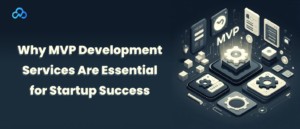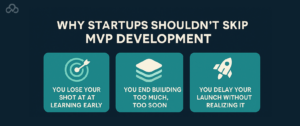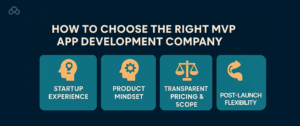Why MVP Development Services Are Essential for Startup Success

Let’s face it, most startups aren’t working with perfect information or unlimited resources. Everyone’s moving fast, but it’s easy to feel like progress takes forever. And in that chaos, it’s tempting to try building everything at once, hoping it’ll all come together. That’s where MVP development services earn their keep.
They help you cut through the noise. Not with assumptions or theories, but with something real, actual feedback from people using your product in the wild. That’s the kind of insight you just can’t fake.
Whether you’re building a tool for small businesses or a mobile app for consumers, starting lean with an MVP isn’t just smart, it’s how most successful startups begin. But it’s not just about doing less. It’s about doing what matters first, and getting it into users’ hands before your burn rate gets the best of you.
MVP Meaning in Software Development
In software development, MVP meaning in software development stands for Minimum Viable Product, a functional but limited version of a product designed to test core assumptions with real users.
The purpose of an MVP is not to launch a “cheap version” of the full product, but rather to deliver just enough value to validate key use cases, observe user behavior, and inform future development decisions.
Here’s how an MVP compares to other early-stage product types:
|
Type |
Purpose |
Level of Functionality |
|
Prototype |
Visual mockups or workflows |
Non-functional or semi-interactive |
|
MVP |
Validates core feature set with users |
Fully functional but limited |
|
Beta |
Tests refined features before launch |
Feature-complete, still in testing |
Too often, teams confuse MVPs with beta releases or low-effort demos. In reality, a well-planned MVP is engineered for learning, not just delivery. That’s why partnering with a specialized MVP development service ensures the output is structured, measurable, and built for iteration.
Why Startups Shouldn’t Skip MVP Development

It’s easy to think you’re saving time by skipping an MVP. After all, why not go straight to the “real” product?
Here’s why that logic rarely works out.
-
You lose your shot at learning early.
Without feedback, you’re guessing. You might get lucky, but most teams don’t. An MVP gives you insight from actual users, fast.
-
You end up building too much, too soon.
Most early products are overloaded with features. And often, only one really matters. The rest? Expensive distractions.
-
You delay your launch without realizing it.
A full product can take six months or more. An MVP, done right, with help from an experienced MVP app development company, can be out in weeks. That head start? Priceless.
Quick real-world example: Zappos didn’t start with warehouses or logistics software. They listed shoes online and bought them from local stores when people placed orders. It was manual, but it proved people wanted to buy shoes online. That was enough.
Bottom line? MVPs aren’t just a way to build less. They’re how you build smarter.
Benefits of Using an MVP Development Service
Working with a professional MVP development service isn’t just about writing cleaner code, it’s about building smarter from day one.
Here’s what startups gain when they skip the DIY route and bring in seasoned MVP developers:
-
Faster execution, without cutting corners
When you’re racing the clock, and your burn rate, a team that knows how to launch lean is invaluable. A good mvp app development company can take your idea from concept to live product in a matter of weeks, not months.
-
Clear technical guidance from the start
One of the most overlooked benefits is strategic input. Reliable MVP developers don’t just build, they ask the tough questions: “Do users really need this now?” “Can this be deferred?” Their input saves you from building too much, too soon.
-
Better validation, cheaper learning
A structured MVP lets you test your core hypothesis with minimal spend. Rather than over-investing in a full build, you can use a lean release to test traction, and pivot if needed.
Example: A B2B SaaS startup partnered with an MVP development service to test a dashboard tool for financial advisors. Within 30 days, they launched with just two core functions. Feedback from 60+ users led them to drop one feature entirely, saving months of dev work they would’ve otherwise spent.
-
Foundation for scalable growth
When you develop custom MVP software, it’s built to evolve. Unlike no-code prototypes, custom MVPs are structured to grow, whether that means adding users, integrations, or features.
What to Expect from a Modern MVP Development Service
So, what exactly does a well-rounded mvp development service offer beyond just software delivery?
A lot more than you might think.
|
Phase |
What You Get |
|
Discovery |
Business analysis, core feature definition, and validation of assumptions |
|
Design |
UX wireframes and UI flows tailored to the MVP’s primary goal |
|
Development |
Iterative builds with weekly demos and feedback checkpoints |
|
Testing |
Functional and usability testing focused on first-user impressions |
|
Post-launch support |
Usage analytics, iterative improvements, and product roadmap consultation |
Teams that specialize in MVPs don’t just code and ship. They help develop custom MVP software that serves a purpose, and adapts as you learn.
When Custom MVP Software Beats No-Code
No-code platforms have their place, but they’re not always the right fit.
Here’s how to decide when to use no-code tools vs. when it’s time to bring in MVP developers to build something tailored.
|
Use Case |
No-Code |
Custom MVP |
|
Internal tools or simple workflows |
Ideal |
Not necessary |
|
High user volume or data sensitivity |
Limited |
Preferred |
|
Complex logic, integrations, or AI features |
Difficult |
Much more flexible |
|
Long-term scalability |
Bottlenecked |
Designed for future growth |
If you’re building something that might evolve into a full SaaS platform or public-facing product, it’s often better to develop custom MVP software from day one. This avoids costly rebuilds and lets your tech stack grow with your traction.
Common Mistakes Startups Make Without an MVP Development Service
Skipping or underestimating MVP development can lead to setbacks that are often expensive, or even fatal, for early-stage startups.
Here are the most common mistakes we’ve seen when teams try to go it alone without the help of a proper mvp development service:
Overbuilding from the start
Founders often want to impress with features, but too many moving parts early on increases scope, cost, and complexity. Experienced mvp developers help you avoid that trap by keeping the first version lean and focused.
Skipping user validation
Building in isolation, without real user input, is risky. A good mvp app development company doesn’t just ship code, they help set up interviews, data capture, and feedback loops from day one.
Unclear product scope
Startups without structured MVP planning often end up with vague specs, shifting goals, and scope creep. A professional mvp development service keeps everything tied to your core problem-solution fit.
Case in point: One startup spent five months developing a multi-role dashboard with no initial feedback. After finally launching, they discovered users only wanted one dashboard view. They lost time, budget, and confidence, all of which could’ve been avoided with early MVP validation.
How to Choose the Right MVP App Development Company

Finding the right partner to build your MVP is just as important as deciding to build one in the first place. Not all development firms are built for startups, especially ones moving fast with limited capital.
Here’s what to look for when evaluating an mvp app development company:
-
Startup experience
Have they worked with early-stage companies before? Do they understand short timelines and rapid pivots?
-
Product mindset
You don’t want someone who just builds what you ask for. You want mvp developers who think critically about what should (and shouldn’t) be built now.
-
Transparent pricing and scope
A reliable partner will give you a breakdown of features, cost, and a realistic delivery timeline, not vague estimates.
-
Post-launch flexibility
MVPs are just the beginning. The best mvp development services offer support for scaling, adding new features, and improving performance over time.
Technical FAQs
Q1: What’s a typical timeline for MVP development?
For most startups, it ranges from 4 to 8 weeks, depending on feature complexity and team availability. A focused mvp development service can often deliver a usable MVP within 30 days.
Q2: How much does it cost to develop custom MVP software?
On average, expect to invest $15,000 to $50,000. More complex builds with custom logic, integrations, or AI may exceed that. A good mvp app development company will help you prioritize features to stay on budget.
Q3: Should we use MVP development services or build in-house?
If you already have an experienced technical team and a clear product plan, in-house might work. But most early-stage teams benefit from working with external mvp developers who can launch faster and avoid technical pitfalls.
Q4: How do MVP services evolve after launch?
Post-launch, the focus shifts to iteration. A reliable mvp development service will help with analytics, bug fixes, roadmap planning, and scalable infrastructure decisions, so you’re ready when growth kicks in.
Build Smarter, Validate Faster
Startups that succeed don’t just build fast, they learn fast.
That’s the entire point of working with a dedicated mvp development service. It’s not about skipping steps. It’s about focusing on the right ones, in the right order, with the right team.
Whether you’re looking to pitch investors, validate user behavior, or find early traction, the MVP is your entry point. And if you want to reduce risk while moving quickly, partnering with a trusted mvp app development company gives you both structure and flexibility.
Do you like to read more educational content? Read our blogs at Cloudastra Technologies or contact us for business enquiry at Cloudastra Contact Us